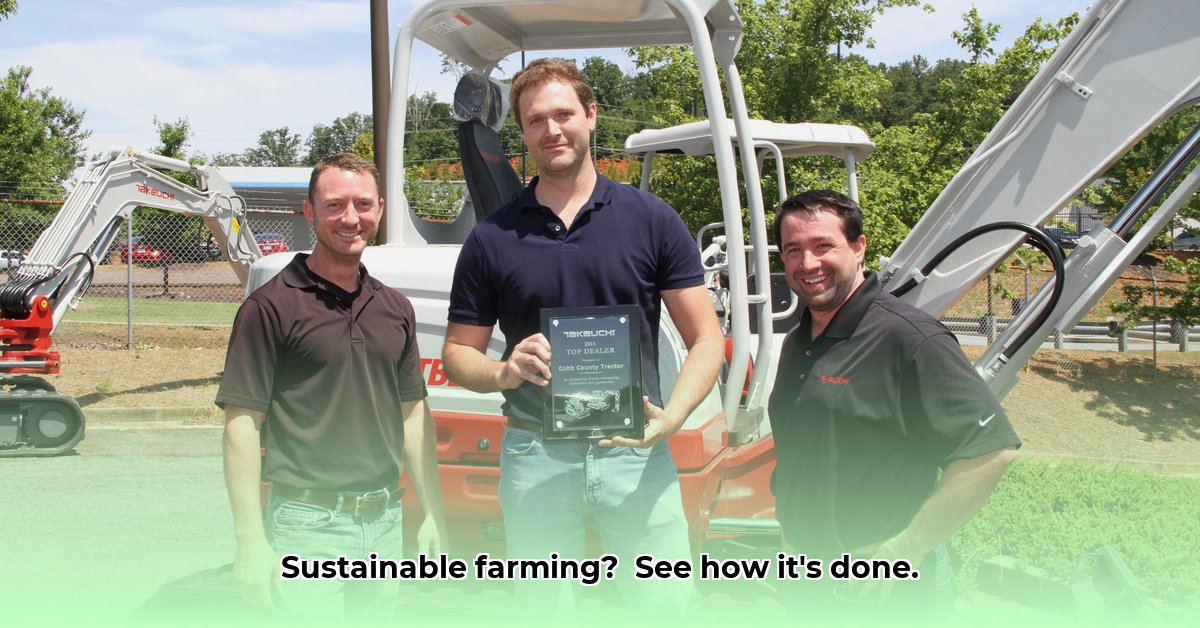
Cobb County Tractor (CCT) has served Metro-Atlanta farmers for over 60 years, witnessing significant agricultural evolution. While initially focused on maximizing crop yield, the industry now prioritizes environmentally conscious practices. This case study analyzes CCT's role in supporting sustainable farming, examining its equipment offerings, commitment to eco-friendly initiatives, and potential areas for improvement. We will explore how CCT can better serve its customer base and contribute to a more sustainable agricultural future. For more information on different tractor types, see this helpful guide: Tractor Types.
A Legacy of Service: Examining CCT's Role in Sustainable Agriculture
CCT's long-standing commitment to the community is undeniable. However, the increasing urgency of environmental concerns necessitates a critical evaluation of their role in promoting sustainable agricultural practices. While CCT offers a broad range of equipment from reputable brands, their website lacks clear communication regarding their commitment to sustainable farming technologies. This lack of transparency raises questions about their proactive efforts in this area. Do they actively promote fuel-efficient machinery, and do they provide guidance to farmers on eco-conscious farming methods?
Key Areas for Improvement: A Roadmap to Sustainability
To effectively contribute to sustainable agriculture, CCT needs a focused strategy that prioritizes transparency, education, and long-term vision. The following recommendations offer a pathway for improvement:
Comprehensive Sustainability Audit: A thorough environmental impact assessment is crucial. This audit should analyze the entire operation, from fuel consumption during equipment transport to waste management practices and energy use at their facilities. Understanding their current environmental footprint is the first step toward meaningful change.
Enhanced Transparency and Communication: CCT's website should prominently showcase the sustainable features of their equipment. A dedicated section highlighting fuel-efficient models, along with quantifiable data on fuel savings and emissions reduction, would build customer trust and attract environmentally conscious farmers. Highlighting partnerships with manufacturers committed to sustainability would further reinforce this commitment.
Investing in Staff Training: Providing employees with comprehensive training on sustainable farming practices is essential. Well-trained staff can effectively advise customers on eco-friendly options and best practices. This not only strengthens their customer relationships but also directly influences the sale of sustainable equipment.
Ambitious Sustainability Goals: Developing a comprehensive sustainability report with measurable targets for carbon footprint reduction demonstrates a serious commitment. Exploring renewable energy sources for their facilities and pursuing relevant sustainability certifications (such as ISO 14001) would signal a proactive approach.
Collaboration for a Greener Future: Engaging Farmers and Government
CCT's transition to a more sustainable model requires collaboration with key stakeholders: farmers and the government.
| Stakeholder | Short-Term Actions | Long-Term Actions |
|---|---|---|
| Farmers | Inquire about fuel-efficient equipment from CCT. Seek guidance from CCT staff on sustainable practices. Consider equipment rentals to reduce upfront costs. | Adopt proactive equipment maintenance to maximize lifespan and minimize waste. Actively participate in educational initiatives offered by CCT on sustainable farming techniques. |
| Government | Offer financial incentives (grants, tax breaks) for farmers investing in sustainable equipment. Fund sustainable agricultural infrastructure development. | Streamline regulations and certifications for sustainable farming technologies. Provide funding for research into sustainable farming methods. |
Fuel Efficiency in Farm Equipment: A Critical Factor in Sustainable Agriculture
Fuel efficiency is paramount in reducing operating costs and minimizing the environmental impact of farming. The choice of tractor depends on various factors, including farm size, operations, location, and budget. While diesel remains prevalent, alternative fuels and electric tractors present promising, albeit currently limited, alternatives. Transparency in fuel efficiency data from manufacturers is crucial for informed decision-making. Government incentives can significantly encourage the adoption of sustainable technologies.
CCT's Case Study: Optimizing Fuel Efficiency
CCT's current equipment offerings need a thorough assessment regarding fuel efficiency. A detailed analysis of their inventory, comparing fuel consumption data across various models to industry benchmarks, is necessary. This analysis should investigate the availability of this data to potential customers. Key recommendations include:
Data Transparency: Publicly accessible, easily understandable fuel efficiency data for all tractors, similar to the fuel economy stickers on cars, is essential.
Equipment Diversification: Forming partnerships with manufacturers of electric or alternative fuel tractors broadens their offerings, attracting environmentally conscious farmers.
Educational Initiatives: Workshops and online resources educating farmers on selecting fuel-efficient equipment would significantly enhance their brand image and commitment to sustainability.
Government Partnerships: Collaborating with government agencies on sustainable agriculture initiatives, seeking funding for research into alternative fuels or charging infrastructure, strengthens their commitment to a sustainable future.
Conclusion: Driving the Transition to Sustainable Farming
The future of agriculture rests on the adoption of sustainable practices. Cobb County Tractor, by embracing transparency, investing in workforce training, and actively collaborating with farmers and the government, can play a leading role in this transformation. Focusing on fuel efficiency and sustainable technology will not only benefit the environment but also enhance CCT's profitability and community standing. The opportunity to contribute to a healthier planet while securing long-term success is a compelling reason to prioritize sustainable initiatives.